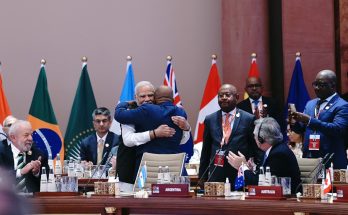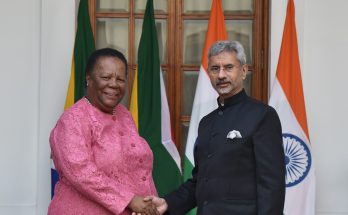Amid a growing bilateral relationship but limited understating of each other, the news media of India and Africa have decided to step up their engagement to unleash the voices of the two youngest regions of the world and create fresh narratives of each other.
The multiple viewpoints emerging from the third edition of the India-Africa Editors’ Forum underscored the need to widen the arc of understanding and forge a concrete plan of action to create new narratives about each other, which are not cluttered by the same old clichés and stereotypes.
Information deficit: No Single Story
In a TED talk, Nigerian writer Chimamanda Ngozi Adichie encapsulated the problem of representation in a wired world, what she called “the danger of a single story.” She recalled with anguish about how a roommate of hers in the United States had a single story of Africa, a single story of catastrophe. Alluding to the Nigerian writer, Vikas Swarup, author and spokesperson of India’s external affairs ministry, set the tone for discussions in his introductory remarks. “Problems with diverse societies like India and Africa is that no single story can do justice to their complexity, diversity and their inherent dynamism and that is why the role of the media becomes so important.”
“The Editors’ Forum was instituted with the objective of bridging information deficit that exists between India and Africa by facilitating broader exposure of African media to India and evoking in Indian media an appreciation of African perspectives,” said Mr Swarup.
Renaissance of New Ideas
Inaugurating the Editors’ Forum, External Affairs Minister Sushma Swaraj reminded senior journalists and editors of India and Africa about the role of the media as a mirror of society and underlined the need for greater dialogue and engagement between the media of the two sides to catalyse “a Renaissance of New Ideas, Thoughts and Vision.”
“We need new initiatives in the Information, Communication, Media and Entertainment (ICME) sectors. These initiatives should be able to unleash the voices of two of the youngest regions in the world – India and Africa – and harness the power of digital, social and new media platforms to bring about a Renaissance of New Ideas, Thoughts and Vision,” Ms Swaraj said. “I believe that the exercise of strengthening relationships between African and Indian news media must be placed on the bedrock of a message of ‘grass-roots empowerment’. Engagement between the Indian media and their counter-parts from the African continent needs to move bottom-up,” added Ms Swaraj.
Referring to the role of Mahatma Gandhi and his influence on journalism, Ms Swaraj spoke about his ability to influence the masses in national and social cause not only by the strength of his message, but also by the way he conveyed it through the weeklies he ran and edited. Quoting Gandhi, Ms Swaraj said: “The sole aim of journalism should be service. The newspaper is a great power, but just as an unchained torrent of water submerges whole countryside and devastates crops, even so an uncontrolled pen serves but to destroy.” Gandhi’s words still carry a deep and abiding resonance, the minister stressed.
The Editor’s Forum saw spirited discussions on three broad overarching themes: ‘2030 Agenda for Sustainable Development and Africa’s Vision 2063’, ‘India-Africa Development Partnership’ and ‘Reforms needed for Global Governance. The forum concluded with a host of suggestions to enhance cooperation between the media of the two emerging regions of the world.
Fast-tracking Security Council reforms
Amid a mutating world order, Mrs Swaraj argued eloquently for the urgent need to fast-track reforms of the UN Security Council, amplifying the message of Prime Minister Narendra Modi ahead of the third India-Africa Forum Summit. “It is also incomprehensible that India which represents almost one-sixth of world’s population and has all credentials to be a permanent member of the Security Council, is still out of it. We all need to work together to remove this anomaly and media has an important role in this.”
Touching upon the Conference of Parties (COP21) and 10th WTO mini, Ms Swaraj said, “In both these meetings also India, Africa and other developing countries will have to work hand-in-hand to ensure that our development agenda is not affected.
Author Profile
- India Writes Network (www.indiawrites.org) is an emerging think tank and a media-publishing company focused on international affairs & the India Story. Centre for Global India Insights is the research arm of India Writes Network. To subscribe to India and the World, write to editor@indiawrites.org. A venture of TGII Media Private Limited, a leading media, publishing and consultancy company, IWN has carved a niche for balanced and exhaustive reporting and analysis of international affairs. Eminent personalities, politicians, diplomats, authors, strategy gurus and news-makers have contributed to India Writes Network, as also “India and the World,” a magazine focused on global affairs.
Latest entries
 In ConversationJuly 26, 2024India-Italy defence collaboration can extend to third countries: Anil Wadhwa
In ConversationJuly 26, 2024India-Italy defence collaboration can extend to third countries: Anil Wadhwa In ConversationJuly 23, 2024Italy views India as a key partner in Indo-Pacific: Vani Rao
In ConversationJuly 23, 2024Italy views India as a key partner in Indo-Pacific: Vani Rao DiplomacyJune 29, 2024First BRICS unveils a roadmap for boosting tourism among emerging economies
DiplomacyJune 29, 2024First BRICS unveils a roadmap for boosting tourism among emerging economies India and the WorldJune 11, 2024On Day 1, Jaishankar focuses on resolving standoff with China
India and the WorldJune 11, 2024On Day 1, Jaishankar focuses on resolving standoff with China







